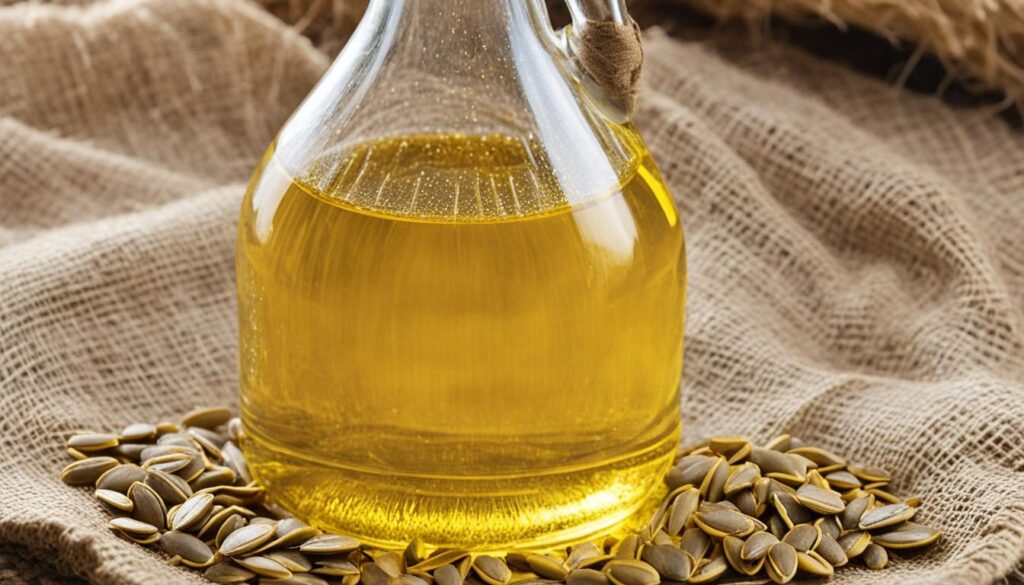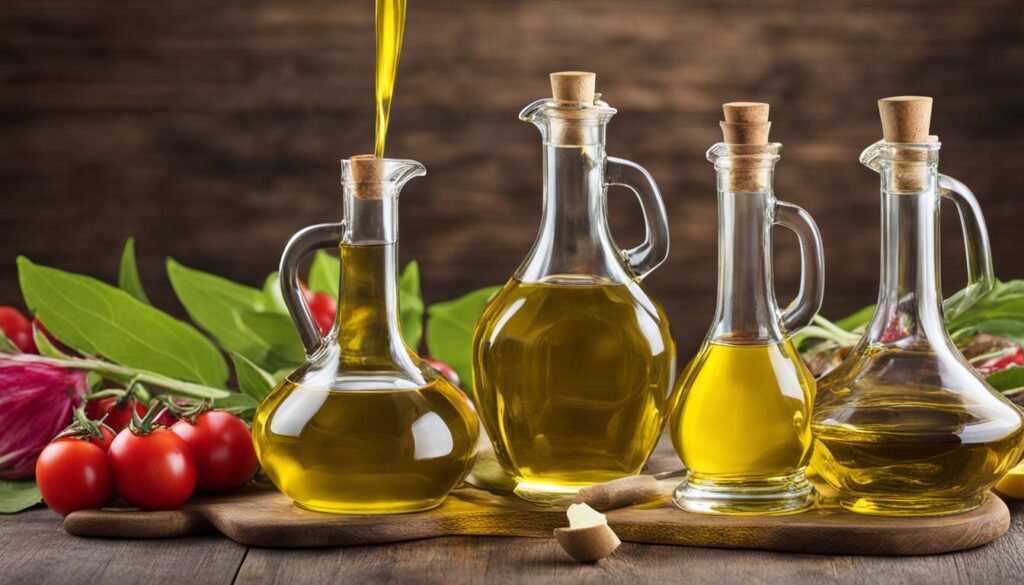Sunflower oil is a versatile ingredient that has a wide range of uses and benefits. Whether you’re cooking up a delicious meal, taking care of your skin and hair, or looking to shed some pounds, sunflower oil has got you covered.
Cooking with sunflower oil is a great choice, thanks to its mild flavor and high smoke point. You can use it for frying, sautéing, and baking, making it a staple in the kitchen. Not only does sunflower oil add a subtle flavor to your dishes, but it also offers a healthier alternative to other oils.
When it comes to your health, sunflower oil is a winner. It is rich in heart-healthy polyunsaturated and monounsaturated fats, which can help promote cardiovascular health. Additionally, it is a good source of vitamin E, an antioxidant that supports immune function.
If you’re looking to improve your skin, sunflower oil can be your secret weapon. Its moisturizing and nourishing properties can leave your skin feeling hydrated and looking radiant. In addition, sunflower oil can work wonders for your hair, enhancing its health and appearance.
And did you know that sunflower oil can even aid in weight loss? With its low saturated fat content and high levels of healthy fats, it can be a smart choice to incorporate into your diet.
So whether you’re in the kitchen, skincare routine, or on a weight loss journey, sunflower oil is a natural and versatile choice.
Key Takeaways:
- Sunflower oil is a versatile ingredient used in cooking, skincare, and weight loss.
- It is rich in heart-healthy fats and vitamin E, promoting cardiovascular health and supporting immune function.
- Sunflower oil can be used for frying, sautéing, and baking, offering a healthier alternative to other oils.
- It has moisturizing and nourishing properties, making it beneficial for your skin and hair.
- When consumed in moderation, sunflower oil may aid in weight loss.
History and Origin of Sunflower Oil

Sunflowers have a rich history that dates back thousands of years. Native to the United States, these vibrant flowers were cultivated by indigenous people as early as 1000 BC. The Native Americans, including the Hopi and Navajo tribes, recognized the nutritional value of sunflower seeds. They used them as a food source and even ground them into flour.
It wasn’t until the 18th century that sunflower seeds made their way to Europe. Russian explorers brought them back from the Americas, and European farmers quickly embraced their potential. It was in Russia where the cultivation of sunflowers for oil production gained momentum.
Ivan Sai Widya was a Russian farmer who played a significant role in developing sunflower oil as we know it today. In the late 18th century, he selectively bred sunflower plants to increase the oil content of their seeds. This led to the establishment of a thriving sunflower oil industry in Russia.
Sunflower oil soon gained popularity not only in Russia but also around the world. Its unique flavor and versatility made it a favorite ingredient in cooking and baking. Today, sunflower oil is widely used in various cuisines and is a staple in many kitchens.
Now let’s take a closer look at the properties and key components of sunflower oil.
| Feature | Description |
|---|---|
| Color | Pale yellow |
| Taste | Mild and neutral |
| Smoke Point | High, around 440°F (227°C) |
| Fat Content | High in polyunsaturated and monounsaturated fats |
| Omega-6 Fatty Acids | Abundant |
| Vitamin E | Rich source |
| Calories | Approximately 120 per tablespoon |
The rich history and origins of sunflower oil have paved the way for its widespread use and popularity. It has become a beloved ingredient, known for its mild flavor, high smoke point, and nutritional benefits. Next, we’ll explore the properties and key components of this versatile oil.
Properties and Key Components of Sunflower Oil

Sunflower oil is a popular cooking oil known for its numerous health benefits and versatile uses. Let’s explore the properties and key components that make sunflower oil such a valuable ingredient.
One of the standout characteristics of sunflower oil is its high content of heart-healthy polyunsaturated and monounsaturated fats. These fats have been linked to a reduced risk of heart disease and can help maintain healthy cholesterol levels. In particular, sunflower oil contains omega-6 fatty acids, which have been shown to lower LDL cholesterol and decrease the risk of coronary heart disease.
In addition to its beneficial fats, sunflower oil is a rich source of vitamin E. Vitamin E is an antioxidant that supports immune function and helps protect the body from oxidative stress caused by free radicals. Incorporating sunflower oil into your diet can contribute to your daily vitamin E intake and promote overall health.
To give you a better understanding of the nutritional value of sunflower oil, here is a breakdown of its components per tablespoon:
| Nutrient | Amount |
|---|---|
| Calories | 120 |
| Total Fat | 14 grams |
| Carbohydrates | 0 grams |
| Sugar | 0 grams |
As you can see, sunflower oil is a calorie-dense oil that primarily consists of fats without any carbohydrates or sugar. This composition makes it a suitable choice for individuals following low-carbohydrate or ketogenic diets.
Overall, sunflower oil’s properties and key components make it a valuable addition to a balanced diet. Its heart-healthy fats, vitamin E content, and low carbohydrate and sugar profile make it a healthier alternative to other cooking oils.
Culinary Uses of Sunflower Oil
Sunflower oil is a versatile cooking oil with a mild flavor and a high smoke point, making it a popular choice in the kitchen. Whether you’re frying, sautéing, or baking, sunflower oil can be a valuable ingredient in a variety of recipes. Its versatility and subtle flavor make it a go-to option for many cuisines.
When it comes to frying, sunflower oil is an excellent choice. Its high smoke point, which is the temperature at which the oil starts to break down and produce smoke, makes it suitable for deep-frying and pan-frying. This means you can achieve crispy and delicious results without worrying about the oil becoming unstable.
If you’re sautéing vegetables or searing meats, sunflower oil can be a great option as well. Its mild flavor allows the natural taste of the ingredients to shine through, while its high smoke point ensures that the oil stays stable at higher temperatures. This makes for perfectly cooked and flavorful dishes.
When it comes to baking, sunflower oil can be a healthier alternative to butter or other oils. Its neutral taste won’t overpower the flavors of your baked goods, making it suitable for various recipes such as cakes, cookies, and bread. Plus, baking with sunflower oil can result in lighter and moister treats.
Let’s take a look at some examples of how sunflower oil can be used in different cooking methods:
| Cooking Method | Example Recipe |
|---|---|
| Frying | Classic French Fries |
| Sautéing | Garlic Shrimp Stir-Fry |
| Baking | Moist Chocolate Cake |
As you can see, sunflower oil can be used in a wide range of recipes, adding its subtle flavor and enhancing the overall taste of the dishes. Give it a try and see how it can elevate your cooking!
Sunflower Oil for Skincare

Sunflower oil is a versatile ingredient that offers numerous benefits for the skin. Its moisturizing and nourishing properties make it a popular choice in skincare products such as moisturizers, serums, and massage oils.
Sunflower oil has the ability to hydrate the skin, helping to improve its overall appearance. It is particularly beneficial for dry and irritated skin, providing relief and soothing inflammation. The oil’s anti-inflammatory properties can help calm redness and promote a more balanced complexion.
The gentle nature of sunflower oil makes it suitable for all skin types, including sensitive skin. It can be used daily without causing irritation or clogging pores. Sunflower oil is easily absorbed into the skin, delivering essential nutrients and leaving it feeling soft and supple.
The Benefits of Sunflower Oil for Skin
When used in skincare, sunflower oil offers various benefits:
- Moisturizing: Sunflower oil provides deep hydration, helping to replenish skin’s moisture barrier and prevent dryness.
- Nourishing: The oil is rich in vitamins and antioxidants, nourishing the skin and promoting a healthier complexion.
- Anti-inflammatory: Sunflower oil can help reduce inflammation, soothing skin conditions such as acne, eczema, and dermatitis.
- Antioxidant Protection: The presence of vitamin E in sunflower oil helps protect the skin from free radicals, which can accelerate aging and damage skin cells.
“Sunflower oil’s moisturizing and nourishing properties make it a popular choice for skincare.”
Sunflower oil can be applied directly to the skin or combined with other ingredients to create DIY skincare products. It can be used as a facial oil, body moisturizer, or even as a carrier oil for essential oils.
Before incorporating sunflower oil into your skincare routine, it’s always recommended to do a patch test to check for any potential allergic reactions. Additionally, consult with a dermatologist or skincare professional if you have specific concerns or conditions.
Sunflower Oil for Hair

When it comes to hair care, sunflower oil is a versatile and beneficial ingredient. Its nourishing properties can moisturize the scalp and enhance the health and appearance of your hair. One of the key reasons sunflower oil is so effective for hair is its rich vitamin E content, which promotes hair growth and reduces hair breakage.
You can incorporate sunflower oil into your hair care routine in various ways. One option is to use it as a conditioning treatment by applying it directly to your hair and scalp. Gently massage the oil into your scalp, working it through the lengths of your hair, and leave it on for a few hours or overnight before rinsing and shampooing as usual.
Another way to enjoy the benefits of sunflower oil for your hair is to look for haircare products, such as shampoos and conditioners, that contain sunflower oil as an active ingredient. These products can help hydrate and nourish your hair, leaving it feeling soft, smooth, and manageable.
Benefits of Sunflower Oil for Hair
The use of sunflower oil in hair care can provide several benefits:
- Moisturizes the scalp: Sunflower oil helps to hydrate the scalp, reducing dryness and flakiness.
- Promotes hair growth: The vitamin E in sunflower oil stimulates hair follicles, promoting healthy hair growth.
- Reduces hair breakage: Sunflower oil can strengthen the hair shaft, preventing breakage and split ends.
Did you know? Sunflower oil is rich in fatty acids, including omega-6 fatty acids, which can improve hair health and help maintain its natural moisture balance.
Whether you choose to use sunflower oil as a standalone treatment or incorporate it into your hair care products, you can enjoy the benefits of this natural ingredient for healthier, more beautiful hair.
| Benefits | How to Use |
|---|---|
| Moisturizes the scalp | Massage sunflower oil into the scalp and leave for a few hours or overnight before rinsing and shampooing. |
| Promotes hair growth | Apply sunflower oil to the hair and scalp to stimulate hair follicles and encourage healthy growth. |
| Reduces hair breakage | Use sunflower oil as a conditioning treatment to strengthen the hair shaft and prevent breakage. |
Sunflower Oil for Weight Loss

Sunflower oil can be a valuable addition to a weight loss regimen due to its composition and nutritional benefits. Although it is important to consume any oil in moderation, sunflower oil offers specific advantages that can support a healthy weight loss journey.
One of the key reasons sunflower oil is considered beneficial for weight loss is its low saturated fat content. Unlike oils high in saturated fats, like butter or coconut oil, sunflower oil contains healthy fats that can help reduce caloric intake while still providing essential nutrients.
The high levels of polyunsaturated and monounsaturated fats in sunflower oil promote satiety, which helps to control hunger and prevent overeating. By incorporating sunflower oil into meals, individuals may experience a greater feeling of fullness, which can support portion control and reduce overall calorie intake.
In addition to its role in calorie management, sunflower oil contains essential fatty acids that are beneficial for overall health. These fatty acids, such as omega-3 and omega-6, play a crucial role in metabolism and can help optimize the body’s ability to burn fat.
It’s important to note that while sunflower oil can be advantageous for weight loss, it should still be consumed in moderation due to its high caloric content.
| Nutrient | Amount per 100g |
|---|---|
| Calories | 884 |
| Total Fat | 100g |
| Saturated Fat | 11g |
| Monounsaturated Fat | 20g |
| Polyunsaturated Fat | 67g |
| Carbohydrates | 0g |
| Sugar | 0g |
| Protein | 0g |
In summary, incorporating sunflower oil into a well-balanced diet can contribute to weight loss efforts. Its low saturated fat content, high levels of healthy fats, and potential impact on satiety make it a beneficial choice for those seeking to manage their weight. However, it is essential to consume sunflower oil in moderation, considering its high caloric content.
Sunflower Oil vs Olive Oil

When it comes to cooking oils, two popular options that often come to mind are sunflower oil and olive oil. While both oils have their merits, they also have distinct differences that make them better suited for certain cooking methods and flavor profiles.
Sunflower Oil:
Sunflower oil is known for its mild flavor and high smoke point, making it a versatile choice for various cooking techniques. It can handle high-heat cooking methods such as frying and sautéing without breaking down or producing a strong taste. This makes sunflower oil ideal for dishes that require intense heat and need to maintain their natural flavors. With its neutral taste, sunflower oil won’t overpower the dish’s ingredients, allowing their flavors to shine through.
Olive Oil:
Olive oil, on the other hand, has a distinct and robust flavor that can range from mild to peppery, depending on the variety. It has a lower smoke point compared to sunflower oil, which means it’s better suited for low-heat cooking methods like simmering, roasting, and drizzling over salads or bread. Olive oil adds depth and richness to dishes, enhancing their overall taste profile. It’s a staple in Mediterranean cuisine and is often used in dressings, marinades, and dipping sauces.
Both sunflower oil and olive oil offer health benefits and are rich in monounsaturated fats, which are heart-healthy fats that can help lower bad cholesterol levels. However, they differ in their nutritional composition. Olive oil contains more monounsaturated fats, while sunflower oil contains a higher proportion of polyunsaturated fats.
Differences Between Sunflower Oil and Olive Oil:
| Sunflower Oil | Olive Oil |
|---|---|
| Mild flavor | Distinct and robust flavor |
| High smoke point – suitable for high-heat cooking | Lower smoke point – better for low-heat cooking and drizzling |
| Rich in polyunsaturated fats | Rich in monounsaturated fats |
Ultimately, the choice between sunflower oil and olive oil depends on personal preference, the cooking method, and the desired flavor profile of your dish. If you’re looking for a neutral oil with a high smoke point, sunflower oil is an excellent option. On the other hand, if you prefer a distinct taste and want to add richness to your dishes, olive oil is a flavorful choice.
Best Quality Selection and Storage of Sunflower Oil

When it comes to choosing the best quality sunflower oil, there are a few factors to consider. By selecting the right product and storing it properly, you can ensure that your sunflower oil remains fresh, flavorful, and beneficial for your health and culinary needs.
Choosing the Best Quality Sunflower Oil
When selecting sunflower oil, look for oils that are cold-pressed or expeller-pressed. These methods of extraction help retain the natural nutrients, flavors, and aroma of the oil. Cold-pressed sunflower oil specifically is extracted without the use of high heat or chemicals, preserving its quality.
Additionally, it is recommended to check the label for certifications, such as organic or non-GMO. These certifications indicate that the sunflower oil has met certain standards and undergone strict quality control processes.
By choosing a high-quality sunflower oil, you can ensure that you are getting the best taste and nutritional benefits from your oil.
Storing Sunflower Oil
Proper storage is essential to maintain the freshness and quality of sunflower oil. To ensure its longevity and preserve its flavor, follow these storage guidelines:
- Store sunflower oil in a cool and dark place, away from direct sunlight and heat sources. Exposure to light and heat can degrade the oil and reduce its quality.
- Prevent air from entering the bottle by tightly sealing it after each use. This helps prevent oxidation and rancidity.
- Avoid storing sunflower oil near strong-smelling substances as it can absorb odors easily.
By storing sunflower oil properly, you can extend its shelf life and maintain its freshness, ensuring that each use delivers the best quality and flavor.
Comparing Sunflower Oil Storage Methods
| Storage Method | Advantages | Disadvantages |
|---|---|---|
| In a cool, dark pantry | – Protects oil from light and heat – Easy access for everyday use |
– Requires pantry space – May be susceptible to temperature fluctuations |
| In the refrigerator | – Provides extra protection against oxidation and rancidity – Prolongs the oil’s shelf life |
– Oil may solidify and require warming before use – Limited space in the refrigerator |
| In a dedicated oil container with a spout | – Convenient for pouring and measuring – Reduces air exposure |
– Additional purchase required – Requires transferring oil from its original packaging |
By following proper storage practices, you can ensure that your sunflower oil remains fresh and of the highest quality, enhancing your culinary creations and reaping the full benefits of this versatile ingredient.
Sunflower Oil Usage Tips and Cautions
When using sunflower oil, it is important to keep some tips and cautions in mind. Here are a few guidelines to ensure the safe and optimal use of sunflower oil:
1. Avoid overheating sunflower oil:
High temperatures can cause sunflower oil to break down and release toxic substances called aldehydes. Overheating can not only compromise the taste and nutritional value of the oil but also pose health risks, including an increased risk of cancer. To prevent this, it is essential to monitor the cooking temperature and avoid reaching the smoke point of sunflower oil.
2. Use sunflower oil in moderation:
Although sunflower oil offers several health benefits, it is important to consume it in moderation. Like all fats, sunflower oil is high in calories. Excessive intake can contribute to weight gain and other health issues. Incorporate sunflower oil as part of a balanced diet and be mindful of portion sizes.
3. Be cautious of potential allergies or sensitivities:
While sunflower oil is considered safe for most individuals, some people may have allergies or sensitivities to sunflower seeds or oil. If you experience any adverse reactions such as skin irritation, digestive issues, or respiratory symptoms after consuming or using sunflower oil, discontinue use and consult a healthcare professional.
By following these usage tips and cautions, you can enjoy the benefits of sunflower oil while ensuring your safety and well-being.
| Usage Tips | Cautions |
|---|---|
| Monitor cooking temperature and avoid overheating. | Individuals with sunflower seed or oil allergies should avoid sunflower oil. |
| Incorporate sunflower oil in moderation as part of a balanced diet. | Discontinue use if any adverse reactions occur. |
Other Topical Uses of Sunflower Oil
In addition to its well-known culinary and skincare applications, sunflower oil can also be utilized in various other ways.
One of the lesser-known uses of sunflower oil is its effectiveness as a natural ingredient in household products. Due to its cleansing properties and mild scent, it can be used as a key component in homemade cleaning solutions. From kitchen countertops to bathroom fixtures, sunflower oil can help keep your home clean and fresh without the use of harsh chemicals.
Another surprising benefit of sunflower oil lies in its potential health properties. Research suggests that sunflower oil may have anti-inflammatory effects and contribute to cardiovascular health. While further studies are necessary to fully understand these benefits, incorporating sunflower oil into your daily routine may have potential advantages for supporting overall well-being.
With its versatility and wide range of uses, sunflower oil proves to be more than just a cooking and skincare staple. From household applications to potential health benefits, harnessing the power of sunflower oil can enhance various aspects of your daily life.
FAQ
What are the uses of sunflower oil?
Sunflower oil can be used for cooking, skincare, and other household applications.
What are the health benefits of sunflower oil?
Sunflower oil is rich in polyunsaturated and monounsaturated fats, which can promote heart health. It is also a good source of vitamin E, an antioxidant that supports immune function.
How can sunflower oil be used for cooking?
Sunflower oil can be used for frying, sautéing, and baking. It has a mild flavor and a high smoke point, making it suitable for various cooking methods.
Is sunflower oil beneficial for the skin?
Yes, sunflower oil has moisturizing and nourishing properties that can benefit the skin. It can help hydrate and improve the appearance of the skin.
Can sunflower oil be used for hair care?
Yes, sunflower oil can help moisturize the scalp and promote hair health. It is rich in vitamin E, which can support hair growth and reduce breakage.
Is sunflower oil helpful for weight loss?
Sunflower oil can be a healthier alternative to oils high in saturated fats, making it potentially beneficial for weight loss when consumed in moderation.
What are the differences between sunflower oil and olive oil?
Sunflower oil has a milder flavor and a higher smoke point, making it more suitable for high-heat cooking. Olive oil has a distinct flavor and a lower smoke point, making it better for low-heat cooking and dressings.
How can I choose and store high-quality sunflower oil?
Look for cold-pressed or expeller-pressed oils, and check for certifications such as organic or non-GMO. Store sunflower oil in a cool, dark place and use it within six months to a year of opening.
Are there any tips or cautions when using sunflower oil?
Avoid overheating sunflower oil, use it in moderation as part of a balanced diet, and be mindful of any allergies or sensitivities.
Are there other uses for sunflower oil?
Sunflower oil can also be used in household products and may have potential benefits for various health conditions.






